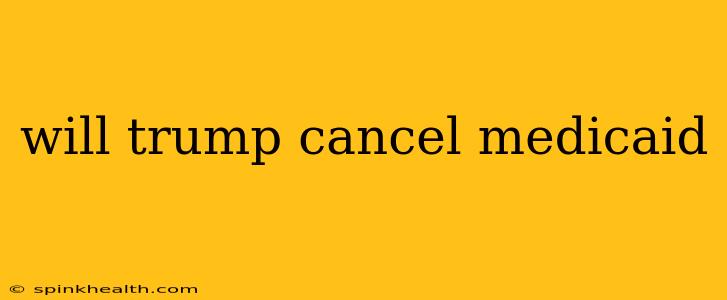Will Trump Cancel Medicaid? Unpacking the Complexities of Healthcare Reform
The question of whether Donald Trump would cancel Medicaid has been a recurring theme in American political discourse. It's a complex issue, fueled by varying interpretations of his past statements and proposals. Let's delve into the intricacies, examining the facts and dispelling common misconceptions. This isn't a simple yes or no answer; understanding the nuances is crucial.
Our journey begins not with definitive pronouncements, but with the evolution of Trump's healthcare platform throughout his political career. Initially, his rhetoric leaned toward repealing and replacing the Affordable Care Act (ACA), which significantly expanded Medicaid. However, the specifics often remained vague, leaving room for various interpretations and fueling anxieties among Medicaid beneficiaries.
What did Trump propose regarding Medicaid during his presidency?
During his 2016 presidential campaign, Trump advocated for a plan to block grant Medicaid to the states. This would shift the responsibility for funding and administration from the federal government to individual states. Proponents argued this would increase state flexibility and efficiency, potentially leading to innovative approaches to healthcare delivery. Opponents, however, expressed concerns about potential cuts in benefits and access to care, particularly for vulnerable populations.
The Trump administration's actions regarding Medicaid were far from a simple "cancelation." While there were proposals to reshape the program through block granting, they ultimately faced significant legislative hurdles. The reality is far more nuanced than a straightforward cancellation.
Could Trump have cancelled Medicaid outright?
While the possibility of a complete Medicaid cancellation was discussed during certain stages of his presidency, it never became a reality. The political realities, coupled with the sheer scale and complexity of the program, made such a dramatic step extremely unlikely. Medicaid serves millions of Americans, including children, seniors, and individuals with disabilities. Any attempt at outright cancellation would have faced tremendous opposition and legislative obstacles.
How would block granting Medicaid affect beneficiaries?
The potential impact of block granting Medicaid is a major point of contention. Supporters believe that block grants would provide states with more control and encourage innovation, potentially leading to more efficient use of funds. However, critics worry that states facing budgetary constraints might reduce benefits or eligibility criteria, potentially leaving many vulnerable individuals without access to vital healthcare services. The reality of the impact would vary greatly from state to state, depending on individual priorities and fiscal situations.
What are the current status and future prospects of Medicaid?
Currently, Medicaid remains a critical component of the US healthcare system. The future of the program, however, remains subject to political debate and the evolving healthcare landscape. While a complete cancellation appears improbable, future modifications and alterations remain a possibility. The ongoing political dialogue regarding healthcare reform will significantly shape Medicaid's trajectory.
In conclusion, while the possibility of major changes to Medicaid under a Trump administration was a significant concern, a complete cancellation never materialized. The complexities of block granting, the sheer number of beneficiaries, and the political landscape all contributed to a far more nuanced reality than a simple "yes" or "no" answer. Understanding the intricacies of the proposals and the political dynamics surrounding Medicaid is crucial for anyone seeking to engage in informed discussion on this critical aspect of American healthcare.

